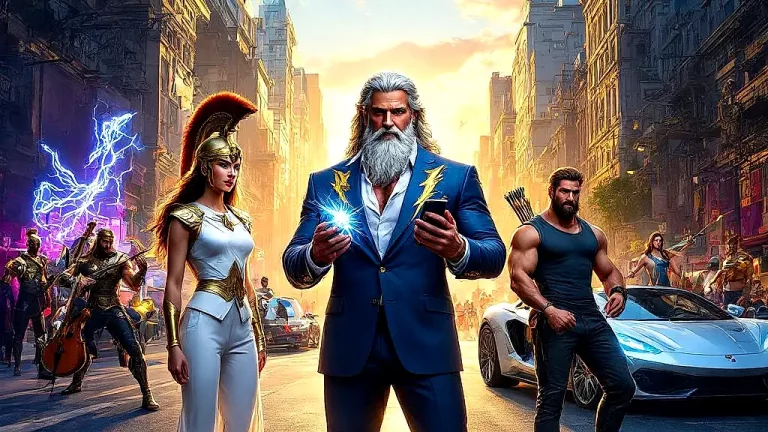Poros: The Greek Spirit Of Resourcefulness And Opportunity
In the complicated world of Greek mythology, Poros stands as the example of resourcefulness and opportunity. Poros, a spirit, has a key role in the stories with myths of ancient Greece. You see his story, tied to themes of cleverness and finding potential when things seem scarce – this concept has been felt through generations. Representations of Poros may change in different stories, but the core meaning stays a proof of human creativity and toughness.
Key Points:
- Poros in Greek myths stands for being clever and turning problems into opportunities.
- He is the son of Metis, linking him to planning and foresight.
- In the myth of Poros and Penia, their union brings forth Eros, the god of love.
- Poros symbolizes finding paths through challenges and is a key thought in Greek philosophy.
- Greek stories and art often feature Poros’ ideas about creative solutions.
- Modern tales reflect Poros by showing resourceful characters solving problems.
- Poros stories shaped ancient Greek views on society, politics, and clever thinking.
Imagine this: Poros is the personification of a moment when challenges appear, yet you eventually find a smart way out. As you read further, you’ll find out how Poros’s tales weave through various stories, marking both ancient Greek philosophical thoughts and modern views of opportunities.
Whether his presence is clear in myths or just hinted at, you still see his impact – it is important, pushing us to look at problems as chances just waiting to be used.
Poros: Overview and Key Facts
| Key Aspect | Details |
|---|---|
| Name | Poros (Πόρος) |
| Role in Mythology | Greek Spirit (Daimon) about Using Resources and Finding Chance |
| Parentage | Often shown as a son of Metis (Wisdom), linked to carefulness and seeing ahead |
| Siblings | Sometimes seen with other abstract figures, about parts of human skills |
| Key Myth | Mainly in the story of Poros and Penia, about how Eros was born |
| Symbolism | Means finding paths through problems (Poros closely means “path” or “way”) |
| Mythical Significance | Means cleverness, having ability for chances, and being smart through problems, key to Greek thoughts |
| Cultural Impact | He affects old Greek thinking, especially when it’s about being flexible and creative |
| Modern Interpretation | Seen as a start of ideas on spotting opportunities and making plans |
This table gives a quick look at who Poros is in myths, pointing out his importance, key connections, and how his ideas last through times and places.
Where It All Started and What Poros Does in Greek Myths
As we look into how Poros began and what roles he plays, you see that his spirit has a complex part in myths. The origins of Poros are important. And his role? Complex in mythology. Interesting enough, Poros appears, and you find out his part is interwoven into Greek stories.
Who Exactly is Poros?
Poros in Greek myths is seen like a smart planner, a spirit that means finding ways through life’s problems. His family background, while not always agreed upon, many call him son of Metis, showing his connection to planning and looking ahead. Interestingly, in some views, his siblings are abstract skills of humans. Think of Poros like a present-day planner, always with an answer for any problem. He stands for resourcefulness and opportunity, able to spot what others miss, showing foresight and ability to adjust. His presence is in many tales, either direct or as a helpful back story, such as:

- The tale of Poros and Penia, where he helps make Eros.
- Stories with gods and people where smart solutions matter.
- Ancient talks by thinkers using his symbol to discuss human skill and creating.
These appearances point out his lasting importance as a symbol of being smart and taking chances in ancient times.
Poros in Greek myths is like a clever guide who finds ways to solve problems, representing resourcefulness and seizing opportunities.
The Story of Poros and Penia
In the famous stories of Greek myths, the tale of Poros and Penia is a vital symbol, about how wealth and poverty, ingenuity, and necessity mix. Poros, spirit of finding ways, went to a feast for Aphrodite. Afterwards, he drank nectar, got drunk, and slept in a garden. Penia, who was poor, took the chance and lay by Poros to have Eros, the god of love.
This union is a strong symbol, meaning that when need joins with clever ideas, the chance for new solutions and beginnings comes up. Interestingly, this mix shows us how need makes new ideas. Poros, who stands for looking ahead, and Penia’s need mean how people often solve problems.

In today’s world, just like back then, challenges turn into new things because of these needs, like how people now make something big from having little. This myth means how taking on problems with a plan can lead to big changes. The story, seen in different ways across areas, keeps the same main lesson. Some places focus more on Eros’s birth, while others talk about Penia’s actions.
Even so, the basic story stays the same, showing how being clever and strong with problems can make big, lasting changes. This old story is more than just an old tale; it acts as a deep idea on need and finding ways, a story that still has meaning today, connecting to love and chances.
Poros in Old Writings
Looking at old texts gives an interesting look into Greek myths, with Poros found in important writings, like Plato’s “Symposium.” Here, Poros comes up in talks about human wants and ideas from gods, seen as smart and finding ways in tough spots. In the dialogue, Poros is represented as a human figure of being clever and solving problems.

The story told by Socrates in this talk makes people think about how changes can lead to good surprises, an idea still useful in solving today’s problems. In other texts, you find Poros as part of resourcefulness intertwined with prosperity and practical intelligence. Picture Poros like today’s business thinker, always planning with little to work with. Poros. Symbol of resourcefulness. Fits many stories.
Sometimes directly, other times hidden in stories of gods or people. This variety shows his rich character and how it shapes different discussions or tales of right and wrong.
Across Greek cities and times, Poros’s character changes can tell us about culture. Some areas focus on his cleverness in stories, others give him a serious role in philosophical ideas. Here’s a table summarizing where Poros appears in writings:
| Textual Source | Description |
|---|---|
| Plato’s “Symposium” | Resourceful and smart, Poros’s story about need with ideas shows birth from finding ways. |
| Hesiod’s Mentions | Concepts like Poros appear often in talks about plans and solving problems, even if not named directly. |
| Roman Interpretations | Roman stories quietly added Poros, sometimes linking him with Mercury, showing respect for solving with cleverness. |
This layout of Poros across stories makes him a flexible character whose story goes beyond myths into the world of thinking and planning, a forever sign of finding chances from hard times.
What Poros Stands For in Being Resourceful and Creative
In both old and new times, Poros is about resourcefulness and creativity. While moving from old tales to today’s meanings, Poros’s example means being resourceful, which is as important now as it was in old times. Poros’s story. It was important in old times. Stays so, even now.
Poros as a Sign of Opportunity
Poros comes into Greek myths not only as the figure of resourcefulness but as a strong sign of opportunity, meaning the possibilities that appear when smart ideas meet difficulties. His being in myths means when folks face troubles, much like Poros, they have the skill to find new routes and seize chances, like business leaders finding gaps to make future fixes.
This picture of Poros means a shared truth: in hard times, the door to being clever gets wide, calling chances once hidden by problems. Simply put, the stories about Poros remind us: opportunity isn’t luck; it’s using what you have to change things.
How Poros Ties into Greek Thinking
Poros’s example of opportunity and cleverness connects strongly with Greek discussions, where he is often called upon to mean the power of smarts and seeing ahead. Greek thinkers like Plato say Poros has the skill needed to beat hard times, and this idea is heard in what they teach about ethics, speaking, and wisdom. The idea of “Poros” matters in their talks, stressing being clever and making plans even when life isn’t clear, just like how today’s leaders must think ahead in uncertain times. Below is a list of noted philosophers and how they view Poros, showing different ideas in Greek thought:

- Plato: Says Poros is the spirit of strategy and resourcefulness, thinking brains matter more than things.
- Aristotle: Even if not said directly, qualities like Poros come up when talking about using good judgment in leading and ethics.
- Socrates: Seen as an icon of smart questions, pushing for strategizing and adaptability.
- Heraclitus: Can link with Poros because of his idea that change and making the most of chances are important.
At the heart of Greek thinking, Poros stays an essential figure, and he inspires talks about chance and planning, making the best of what you have to think smartly.
Poros stands as a key figure in Greek philosophy, representing the importance of smart planning and foresight in dealing with life’s uncertainties, as shown by thinkers like Plato, Aristotle, Socrates, and Heraclitus.
Poros in Other Legends
Having a clear view of how Poros fits in Greek thinking, it’s now a good time to look at his role and similarities in other stories, which reveal a broader picture of resourcefulness and are represented by similar characters.
Checking Out Roman Road Gods
In Roman tales, gods like Mercury and Janus had important jobs in watching over trips and changes, much like guides that kept travel and trade running smoothly across the empire. Mercury, called the messenger god, a lot like Poros with his quickness and changeability, means the idea of turning possible troubles into chances.
Janus, the two-faced god for beginnings and endings, means path and looking ahead for Romans at tricky points. By pathways, these gods watched, making road trips safe as now GPS guides through today’s roads. In this way, they kept travelers on the roads of Rome safe and successful, meaning the thinking and planning like in Poros’s tales.
These road gods were vital to keeping balance and growth in the empire, meaning their lasting impact on Roman customs and myths.

Similar Folks in Different Myths
In Norse tales, Loki is different, a figure showing traits like those of Poros. He is known for cunning and shape-shifting abilities and often gets into smart plans needing a sharp mind and careful thinking. Loki uses wit. He gets through tough spots using creativity, like someone today solving tough problems.
Despite being tricky, Loki is important, showing Norse folks like smartness and being clever, meaning these traits are seen across cultures in ways like Poros’s role. In the same way, in Egyptian stories, Thoth is like Poros by showing wisdom and clever acts. Thoth, praised as the god of wisdom and writing, means brains and new ideas.
Like today’s discovery seekers, Thoth is said to have made hieroglyphs and kept the gods’ info straight, sorting out fights. His tie to the moon links him to fresh starts and learning, key parts of resourcefulness and chance. By looking at these myths, we see people admire clever and strategic thought, painting a bigger picture of shared human values.

How Poros’s Legacy Lives On
After checking out the traits Poros shares with others, it is interesting to see how his cleverness and ways of finding chances affect art, literature, and societal norms today. Poros’s cleverness, once part of myths, now means a lot in many aspects of life. What’s interesting now is seeing how his impact continues shaping our world.
Impact on Greek Stories and Art
Poros’s impact in Greek tales and art is clear in the symbol-like use of resourcefulness and the pursuit of opportunities. In old Greek plays and poems, writers often used themes like Poros’s clever fixes in their stories, showing smart solutions to tough predictions. For instance, in Aristophanes’ funny plays, characters face big challenges.
Yet, with smart thinking and good ideas, they succeed, catching the essence of Poros. These tales see the love for cleverness and appear today in stories where main characters use sharp minds to solve social and moral puzzles. Looking at visual art, you might see how Greek vase pictures and statues mean ideas tied to Poros, honoring human cleverness and winning over hard times.
Artists often showed myths with gods or heroes using super skills, turning Poros’s traits into visuals. This setup is like how today’s films and shows imagine characters beating problems with planning and smarts. Myths with bright ideas in both people and gods are not just art but a kind of teaching that makes people think about these skills in real life.
Through these art forms, Poros stays an important idea, pushing thought and dreams through time.
Poros in Today’s Stories and Shows
In today’s stories, Poros’s traits of resourcefulness and seizing opportunities are often found in how characters handle complex problems, using sharp minds or creativity, similar to heroes in popular movies and series. Movies like “The Martian” and shows such as “Breaking Bad” mean characters who use their wits and available resources to get through huge challenges.
These modern plotlines echo old ideas of Poros, showing us how these themes still connect with watchers who like clever problem-solving stories. Such tales keep pulling viewers in by meaning that even when times are tough, being clever can change problems into opportunities, which is Poros’s constant effect on culture through tales.
Poros’s legacy appears in modern stories, where clever problem-solving and turning challenges into opportunities captivate viewers.
The Role of Poros Stories in Society and Politics
Poros stories, with the core of resourcefulness and smart chance-taking, have shaped the scene of society and politics in ancient Greece. These tales often meant key ideals and ideas, much like those found with Athens’s way of democracy, where taking the right chance counted a lot.
It is just like today when political talks can change how people act, Poros stories made examples of civic values, pushing people to be careful when facing problems. The clever moves seen in stories were like the real tactics used in diplomacy and wars, giving leaders ideas on how to use resources right at home and abroad.
Moreover, the tales about Poros also gave a way to think about social levels and government types. In places where talk and plans were important in politics, the ideas from Poros myths helped teach about planning and being able to change.
Politicians and thinkers often used these tales to argue for new rules or changes, using well-known myths to talk closer to people, much like how a politician of now might use past stories to back today’s topics. These stories made people think about how strong their actions were, and their staying power highlights how vital stories of clever ideas and timing are in figuring out how societies govern themselves.
All the Greek Spirits and Daimones
In Greek mythology, spirits and daimones are often thought of as god-like or part-god beings, dealing with many parts of the world and life, from feelings to natural things. Unlike the main gods and goddesses, these beings appear in unclear spaces between human and godly lives, affecting day-to-day life and nature in small ways. They played important roles.
In myths and prayers, they had a part. They were called on in rituals and prayers, where people hoped to calm them or ask for help. For those drawn to these magical figures and their many roles, a list of all the Greek Spirits and Daimones can give more understanding about their complex place in ancient Greek culture.
FAQs
1. What role does Poros play in the birth of Eros?
Poros plays a crucial role in the birth of Eros by representing abundance and resourcefulness, which, when combined with Penia’s poverty during a feast, leads to the conception of Eros.
2. How is Poros depicted in ancient Greek literature?
Poros is depicted in ancient Greek literature as a creative and resourceful figure, often representing pathways to abundance and solutions in mythological narratives.
3. Why is Poros considered the spirit of resourcefulness?
Poros is considered the spirit of resourcefulness because he symbolizes the ability to create opportunities and find solutions even in challenging circumstances.
4. How does Poros influence modern interpretations of opportunity?
Poros influences modern interpretations of opportunity by symbolizing the ability to creatively navigate challenges and capitalize on advantageous circumstances.







